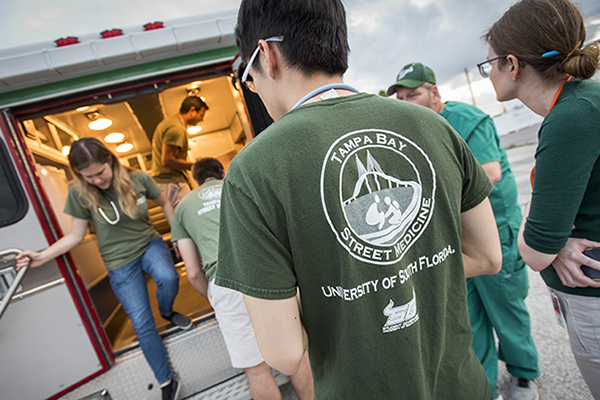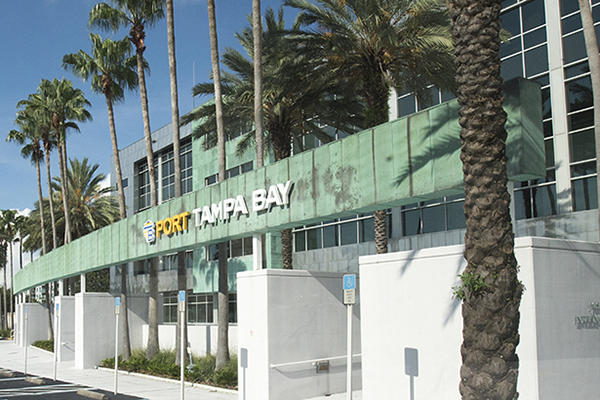USF medical students filling a big gap by providing clinical care to maritime workers at Port Tampa Bay

Street Medicine student volunteers prepare to consult with seafarers in need of medical attention at Port Tampa Bay.
More than 37 million tons of cargo pass through Port Tampa Bay every year, much of it ending up on store shelves and in homes across the country. But, what most people do not realize is the human cost connected to delivering the goods and products that power the world – an issue that students at USF Health Morsani College of Medicine are motivated to solve.
For every cargo ship that makes its way to Tampa Bay, dozens of on-board workers, or seafarers, come with it. They’re the hidden hands that are crucial to the world’s economy since more than 90 percent of global trade is carried at sea.
While the labor these seafarers provide is vital, their health and well-being are often overlooked. The work aboard these vessels is inherently dangerous. Workers can be away from their homes for up to a year at a time and can spend months at sea before coming into port. Once docked, many times, they’re not able to go ashore due to strict security and immigration concerns. Combine those hurdles with low wages and limited access to employer-provided health care and seeing a doctor may be impossible.

For Dennis Martin, general manager of operations, safety and training at Port Tampa Bay, these issues are all too familiar. Martin, who has been involved in the maritime community for more than 40 years, says there are significant challenges in providing health care to the seafarer population and while there are companies that take an interest in their employees’ welfare, many others that do not.
“Owners need to be educated on the importance of looking after their crews,” said Martin, who is also a board member of the Tampa Port Ministries Seafarers Center. “In the short term, we, as responsible people, have to do all we can to assist with the welfare of the crews that visit our port.”

Morsani College of Medicine student Jameson Kuang examining a seafarer. Credit: Tampa Bay Street Medicine
USF medical students are turning that idea into action. Formed in 2014, Tampa Bay Street Medicine (TBSM) is a student-run organization that provides medical care to underserved populations. It was initially started to meet the needs of Tampa’s homeless community but continues to evolve as student leaders recognize opportunities to help elsewhere.
“When this idea came to us we thought that a Seafarer’s Clinic really did align with the mission of Tampa Bay Street Medicine, in terms of helping those who do not have easy access to health care,” said Derek Krinock, a third-year USF medical student and incoming co-president of TBSM. “This is an amazing opportunity for us to bring this care to a vulnerable population.”
Thanks to a partnership between USF Health medical students, Port Tampa Bay and the Tampa Port Ministries Seafarers Center, a non-profit ministry organization that provides support for seafarers, TBSM volunteers are able to travel onto the port and offer basic clinical care to visiting workers. Depending on the wants and needs of the vessels docked at the time, students, along with volunteer faculty physician supervisors, will even go onto ships to care for those who are not able to disembark.
While still in its infancy, the clinics have already been successful. Students set up a clinical space inside the Seafarer Center and conduct physical exams, help seafarers manage chronic conditions and provide acute care when necessary.
“I think most of us will say we went to medical school because we want to be able to help people and improve their lives,” said Abby Pribish, a fourth-year medical student and outgoing co-president of TBSM. “An organization like ours lets students start living that dream even while we’re still in school. And I think that one of the highest impact ways we can do this is by helping underserved populations like the homeless or seafarers gain access to care.”
“I have been involved in the port ministry for fourteen years,” said Al Kocot, president of the Tampa Port Ministries Seafarers Center’s Board of Directors. “This is the first time an opportunity like this has come along. I was amazed that there are doctors and medical students who would volunteer so much of their time to serve others who are in need.”

Morsani College of Medicine students, Derek Krinock (left) and Abby Pribish (right), talk about an upcoming Tampa Bay Street Medicine clinic.
Gina Rathbun, director of physician and community relations for USF Health, initially brought the idea to university officials. Before working at USF Health, Rathbun spent a decade at Port Tampa Bay and knows firsthand the issues facing seafarers. She says she saw this as an opportunity for USF students and faculty to make an impact on a population of people that are often overlooked. She and her colleague, Hiram Green, director of community engagement for USF Health, met with key members of the Seafarers Center and Port Tampa Bay. With support from USF Health Senior Vice President Charles Lockwood, who comes from a long line of merchant marine captains, the desire to help morphed into these student-led clinics.
TBSM officials say the benefit is two-fold; students can provide medical care to people who need it and gain valuable clinical experience while still in school. It’s a concept that benefits everyone involved and something those spearheading the effort believe can be a model for other port communities across the country.
About USF Health
USF Health’s mission is to envision and implement the future of health. It is the partnership of the USF Health Morsani College of Medicine, the College of Nursing, the College of Public Health, the College of Pharmacy, the School of Physical Therapy and Rehabilitation Sciences, the Biomedical Sciences Graduate and Postdoctoral Programs, and the USF Physicians Group. USF Health is an integral part of the University of South Florida, a high-impact, global research university dedicated to student success. For more information, visit www.health.usf.edu
About Port Tampa Bay
Port Tampa Bay is Florida’s largest port and the largest economic engine in west central Florida, supporting nearly 85,000 jobs and generating over $17 billion in annual economic impact. In addition to being a top 10 U.S. cruise port, the port handles a wide array of bulk, break bulk, containers and roll-on/roll-off cargoes, and is a major shipbuilding and repair center.
About Tampa Port Ministries Seafarers Center
The Tampa Seafarers Center is a non-profit Christian ministry organization that seeks to provide an environment for meeting the physical, social and spiritual needs of seafarers and others who use the facilities of the Port of Tampa, regardless of their race, creed, color or religious background. Executive Director Steve Finnesy performs the day-to-day operations at the Seafarers Center.
Photographs by Eric Younghans, USF Health Communications
